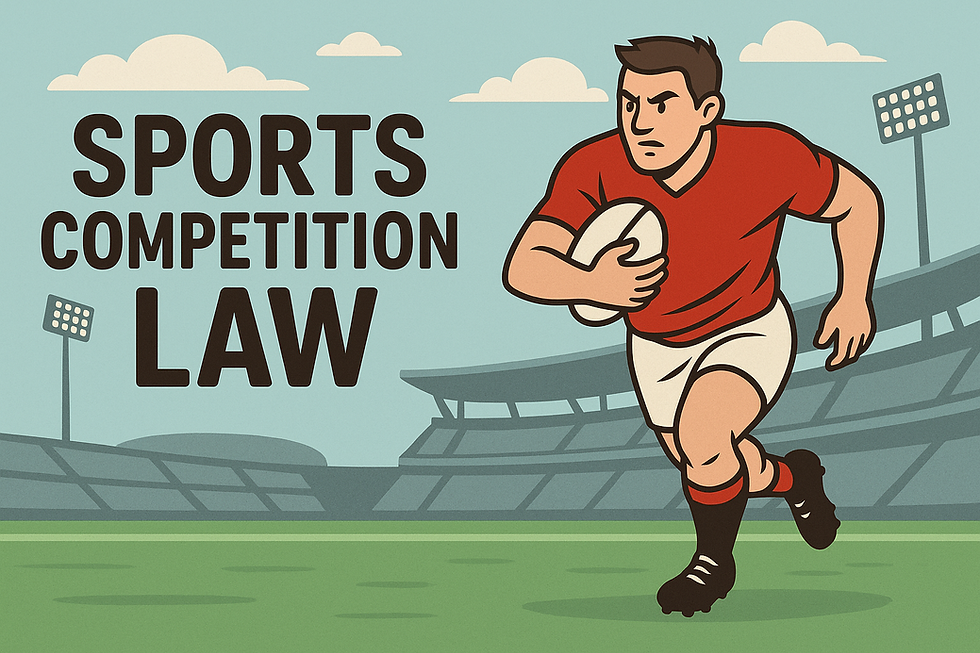From Meca-Medina to International Skaters Union and European Super League: the back bone of competition law in sport
- Bev Williamson
- Sep 11
- 3 min read
Updated: Oct 13

Since the landmark Meca-Medina judgment in 2006, the Court of Justice of the European Union ("CJEU") and the European Commission have built a framework that continues to shape how Europe balances regulatory autonomy with competition principles.
This short post provides a whistle-stop tour of some of those key decisions.
Meca-Medina: setting the analytical test
In Meca-Medina and Majcen v Commission (C-519/04 P, 2006), two long-distance swimmers challenged anti-doping rules as anti-competitive. The Court rejected the idea of a broad “sporting exemption” from EU law. Instead, it established a case-by-case proportionality test: sporting rules fall under EU competition and free movement law but may be justified if they are inherent and proportionate to legitimate sporting objectives. This has become the touchstone for all subsequent case law.
MOTOE: conflict of interest in governance
Just two years later, MOTOE (C-49/07, 2008) applied Articles 101 and 102 TFEU directly to a national motorcycling federation that combined regulatory power with the ability to organise events. The Court condemned the federation’s ability to block rivals competing with it in the market for the organisation of motorcycling events. The case underscored the point that governing bodies must not abuse their regulatory dominance in a way that distorts competition and enables its own commercial advantage.
Broadcasting and transfers: football under scrutiny
Football has long been at the centre of competition law enforcement in sport. In Murphy/FAPL (C-403/08 & C-429/08, 2011), territorial exclusivity in broadcasting rights was curbed as incompatible with the internal market and competition principles. In Olympique Lyonnais (Bernard) (C-325/08, 2010), the Court held that a system of training compensation could, in principle, be compatible with EU law because it encouraged clubs to invest in youth development. However, the rules had to be proportionate and non-restrictive, ensuring they did not unduly hinder a young player’s freedom of movement or amount to an anti-competitive barrier to entering the professional market.
ISU: eligibility rules
The International Skating Union (ISU) (C-124/21 P) eligibility rules case has now become a pivotal case in sports competition law. The European Commission’s 2017 decision found lifetime bans for athletes participating in unsanctioned competitions to be restrictions “by object” under Article 101. The General Court upheld the decision in 2020, and the CJEU confirmed in 2023 that prior approval systems must rest on clear, objective, non-discriminatory criteria. ISU firmly tied governance rules to competition scrutiny.
European Super League and Royal Antwerp: 2023’s turning point
On 21 December 2023, the Court delivered a trilogy of judgments:
European Super League (C-333/21) condemned the lack of transparent and objective criteria in FIFA/UEFA’s prior-approval and sanctions regime.
Royal Antwerp (C-680/21) raised doubts about home-grown player rules under both free movement and competition law.
In parallel, the ISU appeal was resolved, cementing the proportionality test and procedural safeguards for sporting governance.
In European Super League the Court found that FIFA and UEFA’s prior authorisation and sanctions regime breached Articles 101 and 102 TFEU because it lacked transparent, objective, and non-discriminatory criteria. By reserving unchecked power to approve or block rival competitions, the governing bodies distorted market access and abused their dominant position, even if they pursued legitimate sporting objectives.
In Royal Antwerp the Court examined UEFA’s and the Belgian FA’s “home-grown player” rules, which required clubs to include a quota of locally trained players. It held that such rules, while promoting youth development, could infringe free movement of workers and competition law if they indirectly discriminated against foreign players or went beyond what was necessary to achieve their sporting aims.
Together, these rulings established the “backbone” of modern EU sports competition law:
Sporting rules are not exempt.
Justification depends on proportionality and legitimate objectives.
Prior-approval and sanctioning systems require transparency, objectivity, and non-discrimination.
Looking forward: transfers and agents
The recent FIFA v BZ (Diarra) (C-650/22, 2024) case has already extended these principles to transfer compensation and registration systems. Ongoing challenges to FIFA’s new Football Agent Regulations will likely add a fresh layer in the coming years.
Conclusion
From Meca-Medina to ISU and the European Super League, European courts and the Commission have built a coherent line of authority. The message is clear: Governing bodies retain space to regulate, but only where their rules are necessary, proportionate, and non-discriminatory. As the commercialisation of sport increases, more areas of governance are likely to fall within the scrutiny of competition law. Governing bodies must therefore remain vigilant to their obligations—and players equally alert to their rights.


Comments